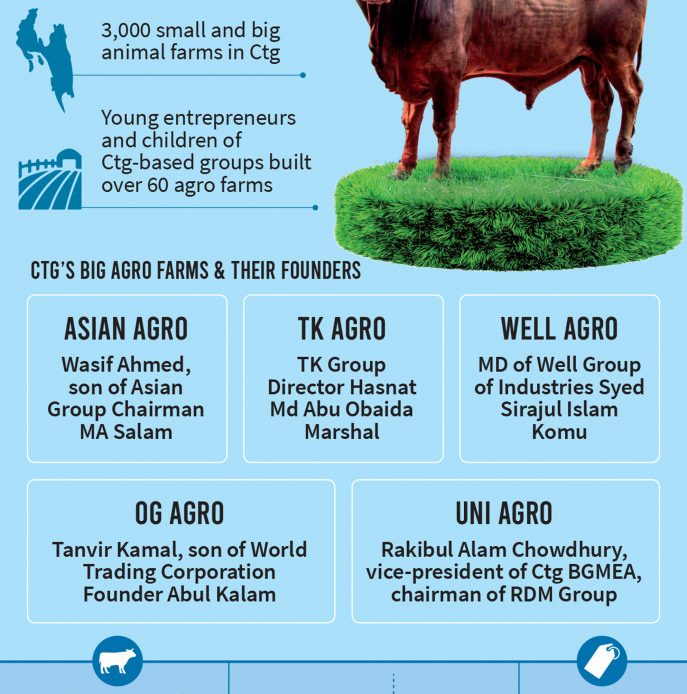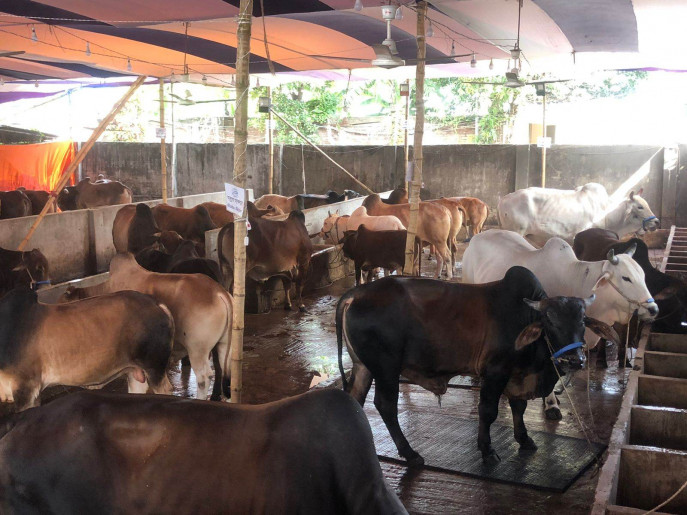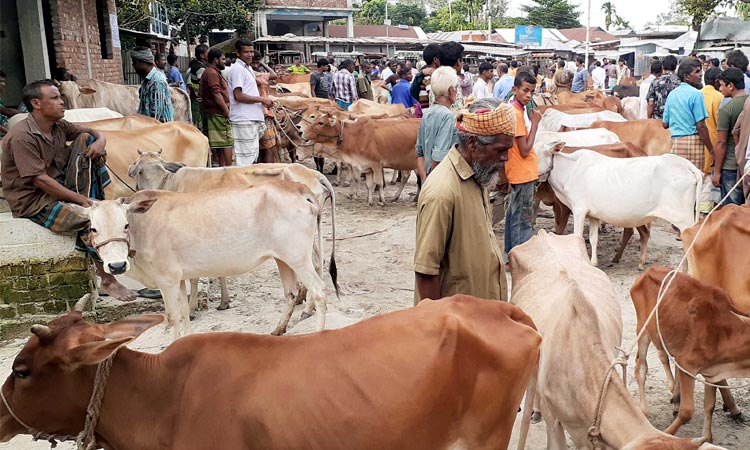Around 10,000 heavyweight cows are ready for sacrifice with prices ranging from Tk2.5 lakh to 15 lakh

Infographic: TBS
It started as a hobby among the young generations of prominent
business groups in Chattogram sometime around 2015. At that time, animal husbandry for milk and meat was not considered a big business model.
But things have changed and over the last eight years, more and more corporate men have become cowboys, rearing hundreds of thousands of cows, especially targeting Eid-ul-Azha.
Let’s take the example of Wasif Ahmed, son of MA Salam — chairman of Asian Group and BGMEA’s first vice-president. Wasif started a cattle farm in 2016 as a hobby with only four cows.

Photo: TBS
The Asian Group has many businesses, but the then 19-year-old gave birth to another business which later turned out to be one of the successful agro farms in Chattogram. Asian Agro has prepared 120 sacrificial animals for this year’s Eid-ul-Azha.
Like Wasif, many young rich people started experimenting with cattle farms. The cattle business is now a fast-growing and profitable agribusiness model in Chattogram.
At present, young entrepreneurs and children of Chattogram-based industrial groups have more than 60 medium and big agro farms. Cows are fattened on these farms keeping in mind the needs of mainly upper-class families.

These 60 farms prepared about 10,000 heavyweight cows for the occasion of Eid-ul-Azha with prices ranging between Tk2.5 lakh to Tk15 lakh.
Hasnat Md Abu Obaida Marshal, the young director of the country’s leading conglomerate TK Group, started TK Agro just the way Wasif did. This farm now has a reliable company for the production of sacrificial animals. This year, 200 cows of Sahiwal, Friesian and Cross Friesian breeds have been fattened on this farm.
Md Abu Obaida told The Business Standard, “The cows of our farm are raised on completely natural fodder. The buyers themselves are welcome to visit and see what kind of fodder is being given to these cows. That is why the buyers trust us. Those who buy sacrificial animals from us once, come to us every year.”
“We have big cows worth as much as Tk8.5 lakh. We sell animals for sacrifice directly from the farm. We never take these animals to the cattle market. Already 30% of the farm’s animals have been sold,” Abu Obaida added.
Rakibul Alam Chowdhury, vice-president of BGMEA and chairman of RDM Group, built up a cattle farm “Uni Agro” on 30 acres of land next to the garment factory during the pandemic.
Uni Agro reared about 100 heavyweight cows this year.
Rakibul Alam told TBS, “We have cows worth Tk2.5 lakh to Tk12 lakh. Basically, our customers are business friends and acquaintances. Keeping their needs in mind, we have prepared the cows. Already 40% of the cows have been sold.”
Another giant industrial company of Chattogram is Well Group’s farm, Well Agro.
Syed Sirajul Islam, managing director of Well Group of Industries, told TBS, “Currently, there are 250 cows on our farm. Our dairy cattle produce a tonne of milk every day. Besides, we sell cows for sacrifice too.”
In the 1990s, one of the renowned import-export companies of Chattogram was World Trading Corporation. After the death of the owner of the company, Abul Kalam, his son Tanvir Kamal built a cattle farm “OG Agro” on about one acre of land on the south bank of the River Karnaphuli.
Tanvir Kamal told TBS that his farm has reared 50 cows for sacrifice this year, but 37 of them have already been sold.
People prefer farm cows over cattle market
According to the Chattogram livestock office, around 50,000 sacrificial animals have been prepared in 3,000 small and big farms in the district for this Eid.
Around 40-50% of the animals on these farms have already been sold, according to farm owners and buyers. The cows that have been sold will remain on the farm till Eid and will be delivered to the specified address before Eid based on the customer’s demand.
In some cases, animals will be sacrificed at the farm and the meat will be sent to the buyer. In both cases, the buyer has to bear separate costs.
District Livestock Officer Dr Md Alamgir told The Business Standard, “Although animal markets have been set up in Chattogram city and 15 upazilas since Tuesday (20 June), the sale of animals at cattle farms began at the beginning of this month.”
“Every year we see that at the last moment, there is a crisis of animals in the markets and the prices also surge a lot. So, to avoid this uncertainty, city residents are buying sacrificial animals from farms in advance,” Alamgir said.
Sajjadur Rahman, a cattle farmer in the Hathazari area, told TBS, “I have been selling sacrificial animals since 2018. At that time, farm cows had to be sold in the market. But since the pandemic hit the country, the situation has changed. Now we do not have to go to the markets to sell animals, instead, 100% of animals are being sold from the farm. I prepared 78 cows this year, 37 have already been sold.”
Visiting several cattle markets on Wednesday, The Business Standard found that an adequate number of sacrificial animals were available in the markets. However, the presence of buyers and sales were relatively low.
Lessees of the markets said most of the city residents buy animals at the last minute due to maintenance problems, so it would take a few days for the markets to pick up steam.
